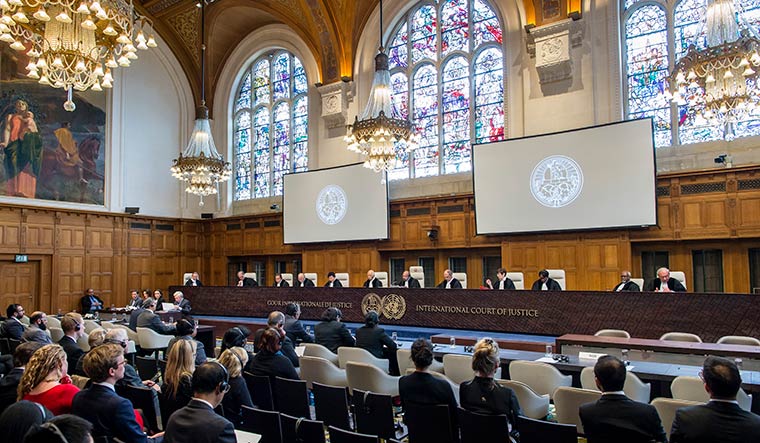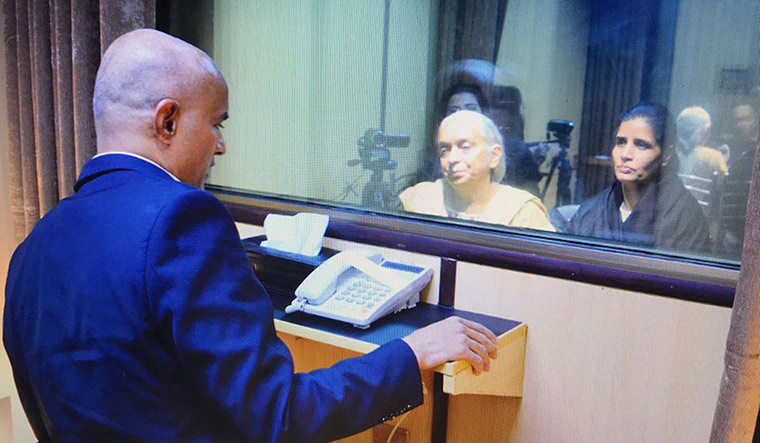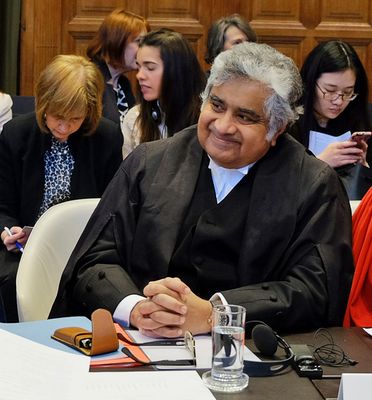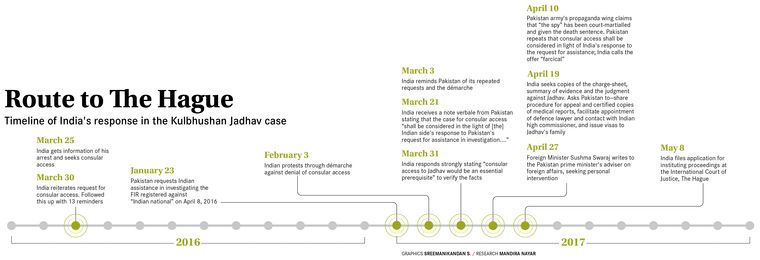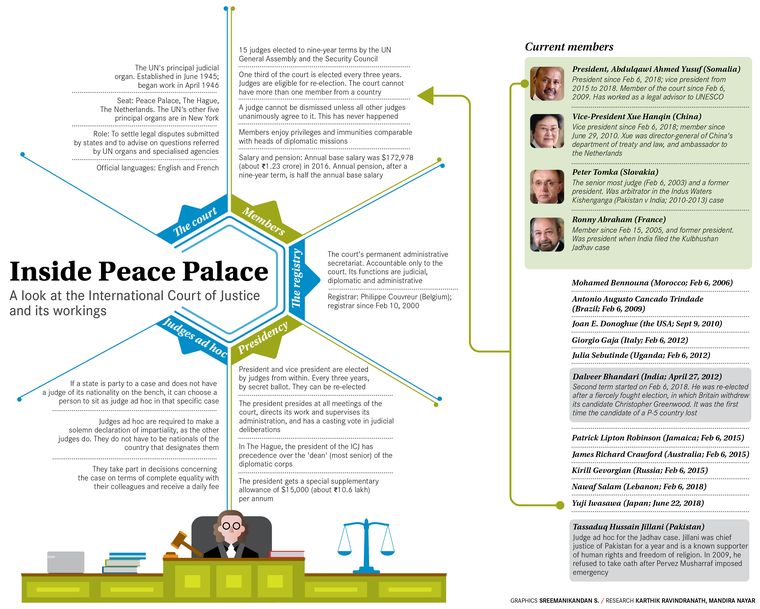It will be late afternoon in Kulbhushan Jadhav’s high security cell in Pakistan, when the 16 people who hold the key to his life gather at the Peace Palace at The Hague on February 18. His family in India, under the protective watch of security agencies, will be praying that the arguments of Harish Salve, the lead Indian counsel, prevail before the judges of the International Court of Justice.
This is the biggest legal battle between India and Pakistan in a long time. Both sides have a narrative that is so compelling that it has reached the doorsteps of the ICJ. For India, it is about a retired Navy officer kidnapped by Pakistan, falsely accused of spying and sentenced to death by a military court. For Pakistan, it is all about making an example out of a spy belonging to its arch enemy.
India surprised Pakistan by going to the ICJ on May 8, 2017. It was the second time that India approached the international court against Pakistan. The issues this time, too, are deeply political. Prime Minister Narendra Modi had tried to improve ties with Pakistan, even inviting Pakistan prime minister Nawaz Sharif along with other SAARC leaders for his swearing-in ceremony in 2014. Modi went a step further during Christmas 2015 by making a surprise visit to Sharif’s ancestral home in Lahore to wish him on his birthday. But, the bonhomie did not last long as terrorist attacks in Pathankot and Uri brought the two nations to the brink of yet another war.
Jadhav has been the perfect opportunity for both India and Pakistan to gain the moral high ground. India made the point that an innocent man, who was denied the chance to defend himself, was sentenced to death after a sham trial. For Pakistan, it was a chance to prove that it, too, was a victim of terrorism.
With the ICJ granting a stay on Jadhav’s execution, Salve had won the first round for India. When he rises on February 18 to defend Jadhav, it will be his third appearance at the ICJ. A veteran lawyer, Salve was handpicked by the Modi government. This is the first time that the government has opted for a completely desi defence team. In the earlier cases, despite having legendary lawyers like Soli Sorabjee, there has always been an international expert. Salve has, however, chosen to fly solo, aided by his young team led by rising star Chetna N. Rai. And, his fees: a princely sum of Re 1.
The decision to approach the ICJ was a stealth operation. India managed to get a hearing within seven days of filing a plea. Mohammad Faisal, Pakistan’s agent at the ICJ, had remarked that his country was “ambushed into appearing” before the court. Pakistan’s counsel Khawar Qureshi got just five days to prepare his case. After hearing both parties, the ICJ unanimously ordered Pakistan to ensure that Jadhav was “not executed, pending the final decision’’.
The court will now examine Pakistan’s argument that Article 36 of the Vienna Convention, which guarantees consular access to detainees, does not apply to persons suspected of terrorism or espionage. But the court’s initial observations seem to favour the Indian position. “Taking into account the legal arguments and evidence presented, it appears that the rights invoked by India in the present case of Article 36, paragraph 1, of the Vienna Convention are plausible,’’ noted the court in its order on May 18, 2017. In addition to the main order, Judge Cancado Trindade appended a separate concurring opinion and Judge Dalveer Bhandari made a separate declaration, bolstering India’s argument about the Vienna Convention and the rights of the accused.
At the next round of hearing, India wants the ICJ to declare that the death sentence awarded to Jadhav by a Pakistani military court was in brazen defiance of the Vienna Convention and the International Covenant on Civil and Political Rights (ICCPR), thereby violating principles of international law. India also wants the ICJ to restrain Pakistan from carrying out the death sentence, and direct Pakistan to “release’’ Jadhav.
Jadhav was arrested by Pakistan on March 3, 2016, allegedly from Chaman in Balochistan, on the border with Afghanistan. According to Pakistan, Jadhav was carrying a fake passport in the name of Hossain Mubarak (born August 30, 1968, in Sangli, Maharashtra). It had an Iranian visa, valid till June 2016, with a permit to stay in the Chabahar Free Trade Zone. India was informed of the arrest on March 25, when the Pakistani foreign secretary raised the matter with Indian high commissioner Gautam Bambawale. India has been seeking consular access to Jadhav ever since. Despite having received 13 reminders, Pakistan has so far refused to budge.
The case, however, goes beyond Jadhav’s incarceration and involves a larger issue. At The Hague, Jadhav is not on trial, nor is India mounting a legal defence for him. “The question is, whether by not giving Jadhav consular access, has he been prevented from defending himself,’’ asked ambassador Narinder Singh, former legal adviser to the ministry of external affairs.
The other issue is whether Jadhav was granted the rights guaranteed by the ICCPR. There is the question about the rights of foreign nationals accused of terrorism and whether they are eligible for consular access. Over the years, the ICJ has heard many such cases. In the Avena case between the United States and Mexico (2004), the court noted that the US violated its obligations under the Vienna Convention by denying consular access to Mexican citizens imprisoned in the US. Similarly, in the LaGrand case (2001) between the US and Germany, too, the ICJ made it clear that domestic laws could not limit the rights of the accused under the Vienna Convention. All such precedents have been cited by India in Jadhav’s case.
Pakistan, however, is of the view that in Jadhav’s case, the scope of consular access is limited and qualified by the 2008 India-Pakistan agreement. In May 2008, India and Pakistan signed an agreement limiting the scope of consular access, by agreeing that both countries had the right to examine such cases on their merits if a person was arrested on political or security grounds. “One has to regard the circumstances within which the Vienna Convention was considered and ultimately adopted…. There is no reference to espionage, spying, let alone terrorism,” argued the Pakistani counsel at the ICJ. “None of the parties that were engaged in this process was even considering the application of this convention to terrorists or spies.”
To counter this line of argument, India will try to show that Jadhav was denied a fair trial. “India believes that the farcical nature of the proceedings and the unjust trial by a Pakistan military court, in egregious violation of the rights of consular access under the Vienna Convention, have led to serious miscarriage of justice,’’ said Deepak Mittal, joint secretary of the ministry of external affairs, in his submission in May 2017 to the ICJ. “It is clear that Jadhav has been denied the right to be defended by a legal counsel of his choice. He has not been informed of his rights to seek consular access.” India has also argued that the conviction and the death sentence were based on his “confession’’, which was obtained in captivity.
This argument will be reinforced, making use of conventions, precedents and recent examples. China, for instance, has allowed consular access to former Canadian diplomat Michael Kovrig, who was arrested in December under the suspicion of causing “harm to national security’’—a euphemism for espionage. China and Canada are locked in a bitter battle over trade and other issues. Russia, too, granted consular access to American citizen Paul Whelan, who was detained in January over espionage charges.
For Pakistan, the challenge lies in proving that India, too, is responsible for terrorism. It has been one of Pakistan’s abiding obsessions and the country has submitted dossier after dossier to the United Nations, detailing India’s alleged involvement in Balochistan. Jadhav’s trial is yet another opportunity for Pakistan to take its arguments forward. Mohammad Faisal, Pakistan’s representative to the ICJ, had argued on similar lines at the May 2017 ICJ hearing. “Having faced the evil of terrorism on a daily basis, with deadly attacks only last Friday (May 12), killing 26 people, and killing another 11 on this Saturday (May 13) in the area where Commander Jadhav was operating before his capture, we know only too well how the poison of hatred is used to achieve political ends by others,’’ he said.
It is also about showing the world the fairness of the Pakistani military trial. “Pakistan will need to show what rights Jadhav had during the trial,’’ said Singh. “Did he have counsel? Was it of his own choosing? Was he allowed to challenge the evidence? Was he given the right to cross examine?’’ As evidence, Pakistan has submitted Jadhav’s allegedly fake passport. India’s refusal to address this issue is being portrayed by Pakistan as vindication of its position. Faisal said the Indian silence was telling. Pakistan also refuted India’s claims that Jadhav did not receive a fair trial. Faisal told the court that Jadhav’s execution was not imminent when India chose to move the ICJ.
“India has sought to persuade the court that we intend to execute Commander Jadhav within days… this is totally false,’’ he said. “Jadhav was entitled to clemency as well as a writ petition. More importantly, if the court forgive my language, we simply have no reason to stop the canary from singing. Others might wish that, we do not.’’
Pakistan has submitted to the court the evidence it gathered from Jadhav, including the video confession and the 13 names that he had volunteered. The next few days will determine whether this evidence holds up against India’s claim that the denial of consular access overrides it all, as without such access, Jadhav was not judged fairly. The two countries will have two days each to refute each other’s arguments. Then, the real deliberations begin. The judges will then discuss the key aspects of the case—perhaps, for months, carefully dissecting each argument—until they reach a decision.
The countdown has begun.



